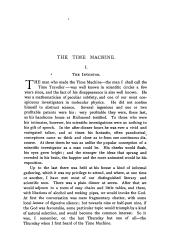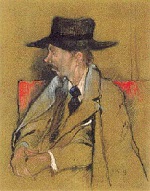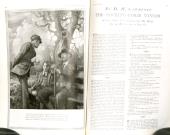Novel
The Time Machine
- by H. G. Wells
- serialized in New Review, (five parts, January to May 1895)
In which H. G. Wells’s third foray into time travel finalizes the story of our favorite unnamed Traveller and his machine, all in the form that we know and love.
The two earlier forays were The Chronic Argonaut (which was abandoned after three installments in his school magazine) and seven fictionalized National Observer essays (which sketched out the Traveller and his machine, including a glimpse of the future and proto-Morlocks). The story of The Time Machine itself had three 1895 iterations:
[ul]
[li]A five-part serial in the January through May issues of New Review, The serial contains mostly the story as we know it, but with an alternate chunk in the introduction where the Traveller discusses free will, predestination, and a Laplacian determinism of the universe.
In addition, material from Chapter XIII of the serial (just over a thousand words beginning partway through the first paragraph of page 577 and continuing to page 579, line 29) were omitted from later editions. This section was written for the serial after a back-and-forth written struggle between Wells and New Review editor William Henley. The material had a separate mimeographed publication by fan and Futurian Robert W. Lowndes in 1940 as “The Final Men” and has since had multiple publications elsewhere with varying titles such as “The Gray Man.”[/li]
[li]The US edition: The Time Machine: An Invention, by H. G. Wells (erroneously credited as H. S. Wells in the first release), Henry Holt [publisher], May 1895. This edition may have been completed before the serial, as it varies from the serial more so than the UK edition. It does not contain the extra material in the first chapter or “The Final Men” (although it does have a few additional sentences at that point of Chapter XIII).[/li]
[li]The UK edition: The Time Machine: An Invention,by H. G. Wells, William Heinemann [publisher], May 1895. This edition is a close match to the serial, with the exception of chapter breaks, the extra material in the first chapter, and “The Final Men” (omitted from what is now Chapter XIV).[/li]
[/ul]
—Michael Main
The two earlier forays were The Chronic Argonaut (which was abandoned after three installments in his school magazine) and seven fictionalized National Observer essays (which sketched out the Traveller and his machine, including a glimpse of the future and proto-Morlocks). The story of The Time Machine itself had three 1895 iterations:
[ul]
[li]A five-part serial in the January through May issues of New Review, The serial contains mostly the story as we know it, but with an alternate chunk in the introduction where the Traveller discusses free will, predestination, and a Laplacian determinism of the universe.
In addition, material from Chapter XIII of the serial (just over a thousand words beginning partway through the first paragraph of page 577 and continuing to page 579, line 29) were omitted from later editions. This section was written for the serial after a back-and-forth written struggle between Wells and New Review editor William Henley. The material had a separate mimeographed publication by fan and Futurian Robert W. Lowndes in 1940 as “The Final Men” and has since had multiple publications elsewhere with varying titles such as “The Gray Man.”[/li]
[li]The US edition: The Time Machine: An Invention, by H. G. Wells (erroneously credited as H. S. Wells in the first release), Henry Holt [publisher], May 1895. This edition may have been completed before the serial, as it varies from the serial more so than the UK edition. It does not contain the extra material in the first chapter or “The Final Men” (although it does have a few additional sentences at that point of Chapter XIII).[/li]
[li]The UK edition: The Time Machine: An Invention,by H. G. Wells, William Heinemann [publisher], May 1895. This edition is a close match to the serial, with the exception of chapter breaks, the extra material in the first chapter, and “The Final Men” (omitted from what is now Chapter XIV).[/li]
[/ul]
—Michael Main
I drew a breath, set my teeth, gripped the starting lever with both hands, and went off with a thud.




